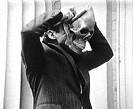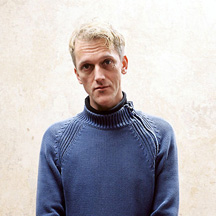Part of Fall 1999
A co-presentation with the Goethe-Institut
Despite Michael Brynntrup’s preoccupation with heavy existential themes of death and personal identity in his work, his acute vision is often viciously ironic, sometimes gloriously campy, but always thoroughly smart. In Love, Jealousy and Revenge (1991), appropriating an ostensibly “found” language lesson, Brynntrup nuances the problem of contemporary communication through witty lip-synch. All You Can Eat (1993) subtly weaves together expressive faces from hot 70s gay porno loops, parodying certain subgenres of “experimental” film, while the classic Loverfilm: An Uncontrolled Dispersion of Information (1996) playfully lists the names and dates of the narrator’s lovers from the late 70s all the way into the 90s, glancing at the implications of loss and death. Tabu V (about which one cannot speak) (1997) takes on Wittgenstein’s infamous adage, “Whereof one cannot speak, thereof one must be silent” and romping throughout NY &lrquo;˜NY &lrquo;˜n why not (1999), drag queens, including Glennda Orgasm, perform a hilarious faux fashion shoot live in busy New York traffic.
Michael Brynntrup was born in 1959 in Münster/Westphalia. Identical twin brother stillborn. Since 1979 he has studied philosophy, law and history of art. From 1987 to 1991 he studied art and film at Hochschule für Bildende Künste in Braunschweig with Gerhard Büttenbender. Since 1989 he has produced over ten films that have exhibited internationally. In 1992 he was the subject of an exhibition and catalogue (Lebende Bilder: still lives) presented by the Museum of Modern Art. He has lived in Berlin since 1982. www.brynntrup.de
All You Can Eat
5:30 min. | 1993 | 16mm & 35mm | colour | sound
Using found footage from early 70s porn films, All You Can Eat takes the “cum-shot” to new heights with a montage of some of the wildest, orgasmic, facial expressions ever composed to a mellow, easy listening sound track. (Boys On Film No.6)
The Deathstrip: A German Film
9:30 min. | 1995 | BetaSP & 16mm | colour | sound
The desolate stretch of land on an overgrown graveyard: on June 17th, 1983, a main character crosses the dead no-man’s land, an incident. Ten years later, on October 3rd, 1993 – an inspection.
Sudden and Unexpected: A Déjà Revue
29:00 min. | 1993 | 16mm | colour & b/w | sound
“To ponder death is to ponder freedom. Those who have learned to die no longer know to serve.”
(Michel de Montaigne, from the essay “Philosophizing Means Learning to Die” )
“Like the beginnings of his films, the endings too are halting. In [Sudden and Unexpected] Udo Kier shuts a door after saying good-bye to the camera, signaling the abrupt end to a maze-like plot which loops around itself, so that the order of events remains opaque (we see the same event from three different perspectives but they seem to occur sequentially).” (Alice Kuzniar, Audacious Allegories: The Queer German Cinema)
Aide Mémoire: Gay Document for Remembering
16:00 min. | 1995 | BetaSP & 16mm | colour | sound
Spare and tough, this memorial portrait of photographer Jürgen Baldiga becomes a meditation on images of life and death. (Inside Out, 1996)
Loverfilm: An Uncontrolled Dispersion of Information
21:30 min. | 1996 | BetaSP + 16mm | colour | sound
This film is based upon true occurrences. Any resemblance to individuals, dead or alive, is not only intentional, but unavoidable. The viewer is also responsible for images made public. Excerpts from my diary and the relevant books of German law. “Noted German experimental filmmaker Michael Brynntrup tantalizes us with his diaristic account of his many lovers. What seems at first to be an extended exercise in ego, gradually becomes a powerful social record of gay life in the years spanning gay liberation and the AIDS crisis.” (Best Experimental Work/New Screen Section, Images Festival, 1998)
NY &lrquo;˜NY ‘n why not
4:00 min. | 1999 | 35mm | colour | sound
Walk/Don’t Walk/Walk. The rhythm of the nineties. A music stroll along Christopher Street. (Special Teddy Award, Berlin Film Festival, 1999)
Michael Brynntrup’s current tour across the USA and Canada has been made possible by a generous grant from Filmförderung des Landes Niedersachsen and with the generous support of the Goethe-Institut.


